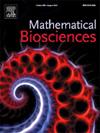Foraging dynamics in social insect colonies: Mechanisms of backward bifurcations and impacts of stochasticity
IF 1.8
4区 数学
Q2 BIOLOGY
引用次数: 0
Abstract
This investigation presents a two-dimensional collective foraging model alongside its stochastic counterpart, simplifying the previous more complex three-dimensional framework utilized to examine foraging behaviors within social insect colonies. We first conduct a thorough examination of the global dynamics of the deterministic model. The results show that the two-dimensional model exhibits equilibrium dynamics, with the possibility of coexistence between non-foraging and foraging equilibrium states. This finding highlights the parallelism between the two-dimensional model and the traditional three-dimensional framework. Following this, an extensive exploration into the long-term collective foraging dynamics within a stochastic environment is conducted, elucidating the interplay between stochasticity and the transitions across distinct stable foraging states. Additionally, the investigation assesses the risk of foraging cessation across varying initial worker populations, subsequently delineating foraging termination warning thresholds. The findings illuminate the multifaceted influence of environmental stochasticity on the collective foraging dynamics observed in harvester ant colonies. Grasping these dynamics furnishes valuable understanding of ecological resilience and the adaptive strategies deployed by collective entities in navigating environmental fluctuations.
群居昆虫群落的觅食动态:后向分岔机制及其随机性影响
这项研究提出了一个二维的集体觅食模型及其随机对应物,简化了以前用于研究群居昆虫群体觅食行为的更复杂的三维框架。我们首先对确定性模型的全局动力学进行彻底的检查。结果表明:二维模型呈现平衡动态,存在非觅食和觅食平衡共存的可能;这一发现突出了二维模型和传统三维框架之间的并行性。随后,对随机环境下的长期集体觅食动力学进行了广泛的探索,阐明了随机性与不同稳定觅食状态之间的相互作用。此外,调查评估了不同初始工人群体停止觅食的风险,随后划定了觅食终止警告阈值。研究结果阐明了环境随机性对收获蚁群体觅食动态的多方面影响。掌握这些动态提供了对生态弹性和集体实体在导航环境波动中部署的适应性策略的有价值的理解。
本文章由计算机程序翻译,如有差异,请以英文原文为准。
求助全文
约1分钟内获得全文
求助全文
来源期刊

Mathematical Biosciences
生物-生物学
CiteScore
7.50
自引率
2.30%
发文量
67
审稿时长
18 days
期刊介绍:
Mathematical Biosciences publishes work providing new concepts or new understanding of biological systems using mathematical models, or methodological articles likely to find application to multiple biological systems. Papers are expected to present a major research finding of broad significance for the biological sciences, or mathematical biology. Mathematical Biosciences welcomes original research articles, letters, reviews and perspectives.
 求助内容:
求助内容: 应助结果提醒方式:
应助结果提醒方式:


